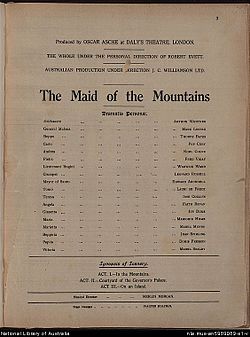| The Maid of the Mountains | |
|---|---|
 Cast list from programme, 1917 | |
| Music | Harold Fraser-Simson, with additional music by James W. Tate |
| Lyrics | Harry Graham and additional lyrics by Frank Clifford Harris and Valentine |
| Book | Frederick Lonsdale |
| Premiere | 10 February 1917: Daly's Theatre, London |
| Productions | 1917 West End |

The Maid of the Mountains, called in its original score a musical play, is an operetta or "Edwardian" musical comedy in three acts. The music was by Harold Fraser-Simson, with additional music by James W. Tate, lyrics by Harry Graham and additional lyrics by Frank Clifford Harris and Valentine, and the book was written by Frederick Lonsdale, best known for his later society comedies such as On Approval. After an initial try-out at the Prince's Theatre in Manchester on 23 December 1916, the show was rewritten and opened at Daly's Theatre in London on 10 February 1917.
Produced by Robert Evett (after being turned down by Frank Curzon) and directed by Oscar Asche (who had directed the record-setting hit Chu Chin Chow), The Maid of the Mountains ran for 1,352 performances in its initial London run – closing mainly because of the nervous exhaustion of its female lead, José Collins. This highly profitable run saved the George Edwardes estate, then being managed by Evett, from bankruptcy.[1]
The original New York production (1918) did not catch on, only running for 37 performances. However, Asche also directed the first Australian production for J. C. Williamson's in Australia in 1917, followed by another production in 1923. This became as successful as the London production, with soprano Gladys Moncrieff becoming famous as Teresa. The show had major London revivals in 1921, 1930, 1942 (starring Sylvia Cecil at the London Coliseum)[2] and 1972 in an Emile Littler production at the Palace Theatre in the West End, and at the Finborough Theatre, London, in December 2006 with a cast including Anita Louise Combe,[3] as well as numerous other professional productions elsewhere.
The musical was popular with amateur theatre groups, particularly in Britain, from the 1930s to about 1970.[4]
- ^ Lamb, Andrew. Sleeve notes from the Hyperion recording (2000), accessed 4 May 2008
- ^ The Times, 2 April 1942, p. 6
- ^ "The Maid of the Mountains – Finborough Theatre", www.indielondon.co.uk, 2016, accessed 21 January 2018
- ^ Bond, Ian. "Rarely Produced Shows" Archived 16 July 2011 at the Wayback Machine. St. David's Players, accessed 22 July 2010